Retinol is the go-to ingredient for anti-aging results—here's why
Plus, how to incorporate the skincare star into your routine
Products are chosen independently by our editors. Purchases made through our links may earn us a commission.
Retinol as a skincare ingredient has a reputation that precedes it. It’s revered for its anti-aging benefits and it comes highly recommended by dermatologists. While you may not be able to recite all of the great things it can do for your skin, you may be considering adding it into your skincare routine because of the hype around it.
Retinol is the only ingredient scientifically proven to stimulate the production of collagen, the protein in skin responsible for its elasticity, which makes it the gold standard for anti-aging products. Despite its greatness, incorporating retinol into your routine can be tricky, as some may find it irritating or drying to the skin. To learn how you should integrate retinol into your skincare regimen, we spoke with Dr. Anne Beal, a board-certified physician and founder of AbsoluteJOI Skincare.
What is retinol?
Retinol is a derivative of Vitamin A and a specific type of retinoid, and it’s available in an over-the-counter for topical use. Retinol's transformation into a skincare superhero happens when it combines with certain cell proteins and enzymes in your skin, converting it into retinoic acid. You can also use retinoic acid directly on the skin, but it’s much stronger and only available as a prescription.
If you’re curious about how OTC retinol differs from prescription retinoids, the latter tend to have a higher concentration of retinoic acid (hence the prescription), and there’s no conversion process that needs to take place in the skin. This means that it works quickly but the trade-off is that it may cause more irritation on the skin. Retinol achieves the same results but is gentler on the skin and takes longer to produce results, making it more friendly for first-time retinoid users.
What does retinol do for your skin?
In addition to promoting collagen production, another benefit of retinol is that it encourages cell turnover. Retinol speeds up the skin renewal process, which results in several skin improvements. “In addition to being effective for treating acne and wrinkles, retinol helps treat hyper-pigmentation as it promotes cellular turnover to help fade marks,” says Beal. The key skincare benefits of retinol:
Reduces the appearance of fine lines and wrinkles: Retinols boost your skin’s production of collagen, a protein in the skin. As a result, your fine lines and wrinkles plumpen up for a smoother effect.
Combats the effects of sun damage: By speeding up healthy cell turnover and boosting collagen production, retinol can effectively reduce most, if not all, signs of sun damage, including dark spots, premature wrinkling, uneven texture, and redness.
Fades hyperpigmentation: As retinol kicks cell turnover into high gear, it also sloughs off dead skin cells for smoother, brighter, more even-toned skin. This includes tackling hyperpigmentation, or the overproduction of melanin, which can occur from acne, hormonal changes, or sun damage.
Fights acne: Without this accelerated skin renewal process, dead skin cells linger around longer than they should, clogging your pores and causing breakouts. Retinol keeps dead skin cells moving and, in turn, keeps your pores—and your skin—clear.
What should you know before using retinol?
Like most beauty and skincare products, you have to take the good with the bad when it comes to retinol. While it can do wonders for your skin, there are things to consider and expert tips to employ if you want to use retinol on your skin. Those include:
Apply retinol at night: Retinols can heighten your sensitivity to sunlight, so much so that product labels (and prescribing doctors) may recommend that you only use the product at night. Beal confirms as much, indicating that wearing a sunscreen during the day is crucial. “Using a daily sunscreen is also necessary when using retinoid products, as they can increase your skin’s sensitivity to the sun’s UV rays,” she says.
Watch for signs of irritation: It’s no secret that retinols and retinoids can cause redness, dryness, flakiness, and even a burning sensation while your skin adjusts to them. “If you’re planning on incorporating retinoids into your skincare routine, it’s best to start slowly to let your skin adjust,” Beal says. “Begin by applying the product two to three times per week at night, slowly increasing your usage depending on how your skin reacts.”
Have patience while you wait for results: In addition to the irritation signs mentioned above, first-time users may notice their skin purging,” which refers to the skin reacting to an active ingredient by producing acne. Beal says that those who stick with use tend to see remarkable results once they get over the hump, but the irritation may make you want to stop. “Retinols are very effective for treating hyperpigmentation, but they require patience,” says Beal. “While you can see some results in as little as six weeks, the full benefits of retinol for fading dark marks can be seen after three to six months of regular use.”
Give it some breathing room: With busy schedules and our minds on the next five things at any given moment, it’s no secret that we’re all in a rush. The name of the game is to get everything done faster, and our skincare routines are no exception. However, Dr. Beal encourages users to give their skin a moment to breathe, so to speak. She advises, “Try to wait at least 20 minutes before applying any product on top of your retinol to ensure your skin is receiving a full concentration of this powerful ingredient.”
As another option for curbing potential irritation, Beal suggests using retinol oils. “This is especially good for people with sensitive or dry skin as it combines the skin renewal properties of retinol with the hydrating and protective effects of oils,” she says. Moreover, Dr. Beal advises against using more than one vitamin A-based product on your skin at the same time so that you can effectively manage the process and prevent overdoing it.
1. For a night cream reviewers swear by: Roc Retinol Correxion Deep Wrinkle Night Cream
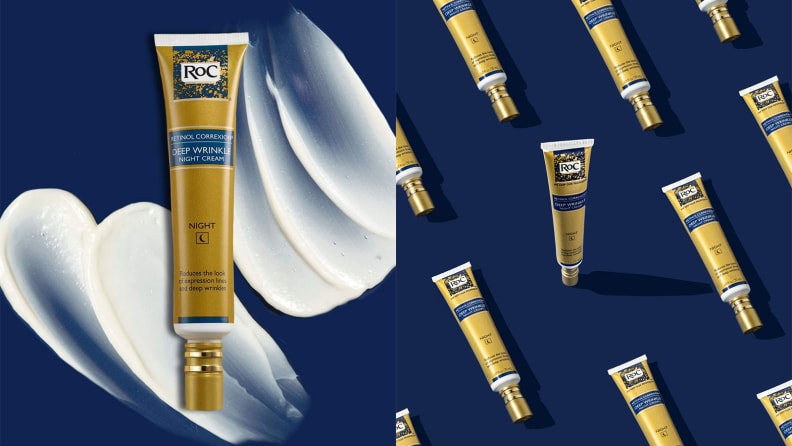
Add hydration and retinol into your routine with the Roc Retinol Correxion Deep Wrinkle Night Cream.
When it comes to skincare products with retinol, Roc has seemingly become a household name, and one look at the 7,000-plus stellar reviews tells you why. This night cream contains Roc’s “mineral complex” to boost hydration in addition to retinol, making it effective but still gentle enough to use every day.
One Amazon reviewer writes: “I like this stuff! I’ve bought three tubes over a period of two years—the small tube goes a long way. I usually use it morning and night. I’m a middle-aged female and can definitely see a decrease in lines on my forehead, around my eyes, and sides of my mouth. I’ve bought a ton of products on Amazon and this is my first review of a product because it’s a face cream that actually works for wrinkles, for me.”
Get the RoC Retinol Correxion Deep Wrinkle Night Cream on Amazon for $16.02
2. For an oil that minimizes irritation: Sunday Riley Luna Retinol Sleeping Night Oil
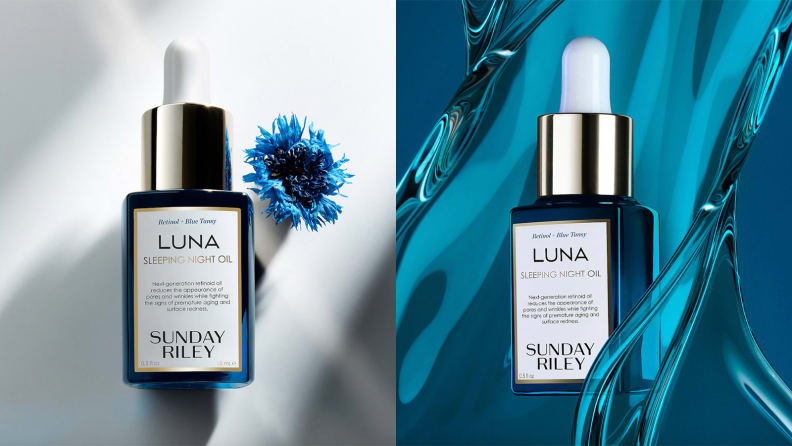
Before moisturizing, apply the Sunday Riley Luna Retinol Sleeping Night Oil to your skin.
Beal indicated that a retinol oil can curb the irritation often associated with retinols, and the fan-favorite Sunday Riley Luna Retinol Sleeping Night Oil does just that. This retinol oil claims to leave your skin looking plumper and more radiant, plus it reduces the look of fine lines and wrinkles. Moreover, it’s made with a blend of trans-retinol ester (a gentler form of retinol), blue tansy, and German chamomile, all of which work in concert to soothe irritated skin.
“Due to my acne-prone skin, I was very skeptical about this product’s formula being an oil. However, I was delightfully surprised,” one Sephora reviewer gushes. “I bought a full size after seeing the results. After a month, my skin was clearer, pores smaller, and my skin brighter. I have used a number of retinol products (including SR A+ High Dose Retinoid Serum), and this is my new favorite. For me, [it’s] worth every penny.”
Get the Sunday Riley Luna Retinol Sleeping Night Oil on Sephora for $105
3. For a budget-friendly serum: The Ordinary Granactive Retinoid* 2% Emulsion
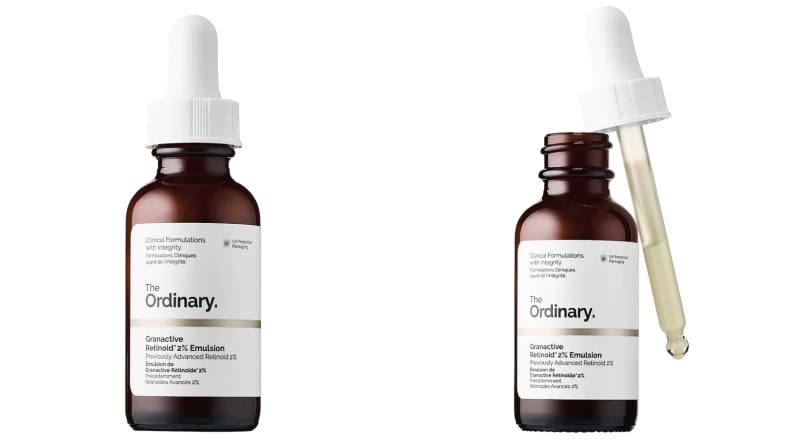
Try retinol on a budget with The Ordinary's Granactive Retinoid* 2% Emulsion.
This retinol serum by The Ordinary is an excellent introductory option, both for your skin and for your budget. It contains granactive retinoid; think of it as retinol 2.0 for a better fight against early signs of aging—but without a prescription or the considerable irritation.
One Sephora reviewer raves: “Wow, this stuff is amazing! In under a week, I’ve seen a huge difference in my skin (like double-take in the mirror difference). My skin is firmer, clearer, plumper, and my fine lines are almost non-existent. My skin is becoming super-sensitive to products as I age, and I knowingly took a risk using retinoid, but this really is so gentle. Aside from a tiny bit of purging, I have experienced zero redness and no dry/flaky patches.”
Get the The Ordinary Granactive Retinoid* 2% Emulsion on Sephora for $9.80
4. For an anti-aging moisturizer: L’Oréal Revitalift Triple Power Anti-Aging Moisturizer
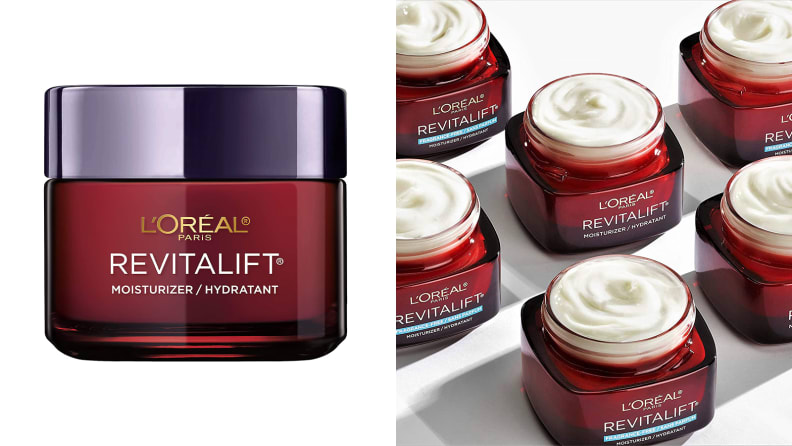
Moisturize your skin and apply retinol at the same time with the L’oreal Revitalift Triple Power Anti-Aging Moisturizer.
Made with a blend of retinol, hyaluronic acid, and vitamin C, L’Oréal’s Revitalift Triple Power Anti-Aging Moisturizer claims to firmen, hydrate, and brighten the skin, respectively. With continued use, it claims to reduce the look of fine lines and wrinkles.
One Amazon reviewer cuts to the chase: “I’ve been using Revitalift for about four years, and I get compliments all the time about my skin and how much younger I look. Loyal customer.
Get the L’Oréal Revitalift Triple Power Anti-Aging Moisturizer on Amazon for $27.06
5. For face mask that’s safe for sensitive skin: Glow Recipe Avocado Melt Retinol Face Sleeping Mask
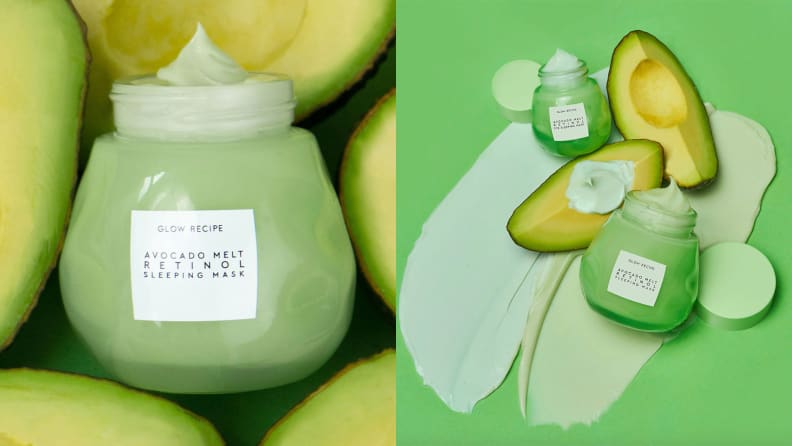
Use the Glow Recipe Avocado Melt Retinol Face Sleeping Mask for a boost of retinol and moisture.
Glow Recipe’s Avocado Melt Retinol Face Sleeping Mask claims to improve the look and feel of your skin after one use. The encapsulated retinol offers a time-release effect, the PHA (polyhydroxy acid) gently exfoliates your skin, and soothing avocado calms irritated skin and controls blemishes.
“If you’re new to retinol or starting your preventative anti-aging care, this is the product for you,” one Sephora reviewer writes. “I absolutely love the texture and feel of this product. I have been using this product for about two months now, every other night. I can see improvement in the overall texture of my skin, and when I wake up my skin is super supple. The product has encapsulated retinol which will release doses throughout the night, making it great for people with sensitivity.”
Get the Glow Recipe Avocado Melt Retinol Face Sleeping Mask on Sephora for $49


